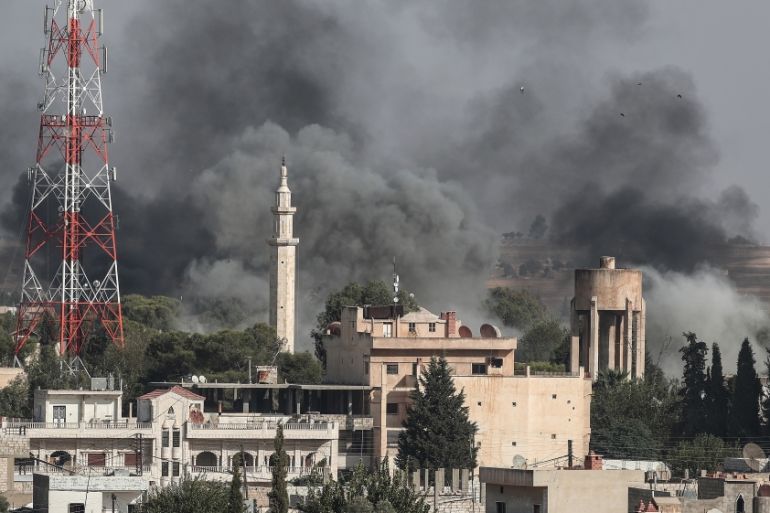European powers urge Turkey to ‘cease’ Syria operation
European members of UN Security Council register ‘deep concern’ as US warns Ankara of consequences if it flouts rules.

European powers on the United Nations Security Council (UNSC) have called on Turkey to “cease” its offensive against Kurdish forces in northeastern Syria, as the United States’ envoy to the world body warned Ankara of consequences if it does not “play by the rules”.
The comments on Thursday came after an emergency meeting of the 15-strong body on Syria, as fighting in towns along the Turkish-Syrian border intensified and forced thousands of people to flee their homes.
Keep reading
list of 4 itemsIran claims ‘right to self-defence’ in Israel attack
US: Iran ‘will be held responsible’ for further attacks
UN Security Council meets after Iran launches attack on Israel
- Look: Civilians fleeing Turkey’s operation in Syria
- Two notorious ISIL fighters taken into US custody
- Does anybody think Turkey’s operation is a good idea?
“We are deeply concerned by the Turkish military operation,” the UNSC’s five European members – Britain, France, Germany, Belgium and Poland – said in a joint statement
“Renewed armed hostilities in the northeast will further undermine the stability of the whole region, exacerbate civilian suffering and provoke further displacements [of people],” the statement, delivered by Juergen Schulz, Germany’s deputy ambassador to the UN, added.
Moments earlier, Kelly Craft, Washington’s ambassador to the UN, had warned Ankara it faced repercussions if it did not protect vulnerable populations or contain the Islamic State of Iraq and the Levant (ISIL or ISIS) group.
“Failure to play by the rules, to protect vulnerable populations, failure to guarantee that ISIS cannot exploit these actions to reconstitute will have consequences,” Craft told reporters after the closed-door meeting in New York.
For his part, Russian envoy Vasily Nebenzya said Turkey’s operation “is the result of demographic engineering” committed by members of the US-led coalition against ISIL.
“Now the coalition is reaping the fruits of their demographic policies in that part of Syria,” he added.
Separately, UN chief Antonio Guterres said in Copenhagen it was “absolutely essential” to de-escalate the conflict.
In a later on Wednesday, Turkey told the UNSC that its military operation would be “proportionate, measured and responsible” and would “only target terrorists and their hideouts, shelters, emplacements, weapons vehicles and equipment.
“All precautions are taken to avoid collateral damage to the civilian population,” Turkey’s. UN Ambassador Feridun Sinirlioglu wrote.

The Turkish air and ground operation was launched three days after US President Donald Trump opened the way by pulling his country’s troops from their positions near the border alongside the Kurdish-led Syrian Democratic Forces (SDF), Washington’s main ally in the fight against ISIL
Turkey considers the SDF to be an extension of the Kurdistan Workers’ Party (PKK), which has waged a decades-long armed campaign for autonomy in Turkey and is designated as a “terrorist” group by Ankara and many other Western capitals.
Turkish President Recep Tayyip Erdogan says the goal of the operation is to create a buffer zone freed of the Kurdish fighters within which some of the 3.6 million refugees currently residing in Turkey can also be resettled.
In a speech on Thursday, Erdogan dismissed criticism of the operation and threatened to send more than three million Syrian refugees into Europe.
Also on Thursday, the Turkish foreign minister Mevlut Cavusoglu said Ankara would take responsibility for suspected ISIL fighters held by SDF.
“If Daesh (Islamic State) camps or prisons are in the safe zone, we are responsible,” Cavusoglu told international media, adding that Ankara would ask the home countries of foreign ISIL fighters in its zone to take them back.
If the foreign countries refuse, as many have, “it is our responsibility that they [ISIL prisoners] are held accountable and not released,” he said, adding that Turkey would not be responsible for ISIL prisoners held in other parts of Syria.
‘Urgent action’
Both Turkey and the SDF have reported civilian casualties since the launch of the Turkish operation on Wednesday.
SDF mortar and rocket fire killed at least six civilians in Turkey’s southern Mardin and Sanifurla provinces, the provinces’ governors’ offices said on Thursday.
Turkish operations – including air raids and artillery bombardment – meanwhile left nine civilians in SDF-controlled parts of Syria dead, according to the group.
The fighting has sent tens of thousands of people scrambling to escape the region and placed many more in danger, the UN’s refugee agency (UNHCR) said in a statement on Thursday.
“Hundreds of thousands of civilians in northern Syria are now in harm’s way. Civilians and civilian infrastructure must not be a target,” UNHCR Commissioner Filippo Grandi said.
Grandi’s warning was echoed by a coalition of 14 international aid agencies – including medical charity Doctors Without Borders (Medecins Sans Frontieres, or MSF) and Oxfam – which said an estimated 450,000 people living within 5km (3 miles) of Syria’s border with Turkey were “at risk”.
“Urgent action is needed to ensure that the humanitarian situation in north-east Syria does not worsen further, with potentially dire consequences for families and children who find themselves once again caught up in deadly violence,” the coalition said in a joint statement.
Since erupting in 2011, Syria’s war has generated the largest refugee crisis in the world, with about 5.6 million of the country’s citizens now spread across the surrounding region, according to UNHCR. More than 6.2 million others are also displaced within Syria’s borders.